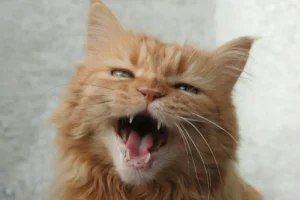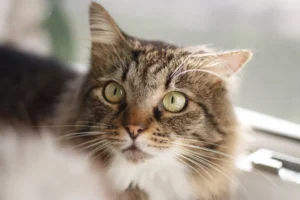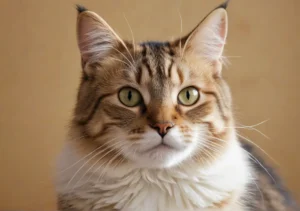Your cat’s meows may be a little raspier than usual, leaving you wondering, “Why does my cat have laryngitis?” From environmental factors to underlying health issues, there are a variety of reasons your feline friend may be experiencing this condition. Let’s explore the potential causes and solutions to help your cat find relief.
If your cat seems to be losing their voice or have a hoarse meow, it’s possible they have laryngitis. Laryngitis in cats can be caused by a range of factors, including excessive meowing, respiratory infections, allergies, or even more serious conditions. Understanding the root cause is essential in determining the best course of action for your cat’s health and well-being.
Identifying the Symptoms of Laryngitis
If your feline friend is suddenly sounding more like a squeaky toy than a lion, they might be experiencing laryngitis. Symptoms of laryngitis in cats include hoarse meowing, difficulty swallowing, and excessive coughing. Your kitty might also seem more subdued than usual, avoiding interaction or struggling to groom themselves.
Common Causes of Laryngitis in Cats
Laryngitis in cats can be triggered by a variety of factors. Environmental irritants like smoke, dust, or strong odors can irritate your cat’s throat, leading to laryngitis. Underlying health issues such as upper respiratory infections, allergies, or even acid reflux can also contribute to this condition. Additionally, overuse of the voice (yes, cats can talk too much!) or trauma to the larynx can result in laryngitis in our feline companions.
Remember, if your cat is experiencing persistent laryngitis or if the symptoms are severe, it’s crucial to consult your veterinarian for a proper diagnosis and treatment plan.
And here’s an extra tip: Keeping your cat’s environment free of
irritants
Seeking Veterinary Care
If your cat is showing symptoms of laryngitis such as hoarse meowing, difficulty swallowing, or excessive drooling, it’s time to head to the vet. Not all cases of cat laryngitis resolve on their own, so a professional evaluation is crucial. During the examination, the vet may perform a physical assessment, possibly take a throat swab for analysis, or recommend further testing like bloodwork to pinpoint the underlying cause. Remember, early detection and treatment are key to your cat’s health and well-being.
Treatment Options for Laryngitis
When it comes to treating your cat’s laryngitis, your vet may suggest medication to reduce inflammation and pain. Rest is also crucial, so encourage your cat to relax and avoid excessive meowing. Additionally, consider making environmental modifications to reduce any triggers that could be irritating your cat’s throat. Remove potential irritants like smoke or strong odors from your home to help your furry friend recover more quickly.
Additional Unique Insight: One effective treatment option for cat laryngitis is humidifying the air in your home. Dry air can exacerbate throat irritation, so using a humidifier can help keep your cat’s throat moist and soothe any discomfort they may be experiencing. Just be sure to clean the humidifier regularly to prevent mold growth and maintain optimal air quality for your feline friend.
Preventing Laryngitis in Cats
If you’re wondering why your cat has laryngitis, it could be due to factors like excessive meowing, respiratory infections, or even environmental irritants. One way to help prevent laryngitis in cats is by ensuring they have a calm, stress-free environment. Cats can get stressed easily, leading to excessive vocalizations that strain their vocal cords. Creating a safe and comfortable space for your feline friend can minimize their need to meow excessively, reducing the risk of laryngitis.
Another important aspect of preventing laryngitis in cats is monitoring their vocalizations. If you notice your cat meowing excessively or with hoarseness, it may be a sign that something is wrong. Regularly observing your cat’s vocal behavior can help you detect any changes early on and take necessary steps to address them. Additionally, scheduling regular check-ups with your veterinarian can ensure your cat’s overall health and catch any potential issues before they escalate.
Remember, providing proper care, creating a stress-free environment, and monitoring your cat’s vocalizations are key to preventing laryngitis and keeping your furry friend healthy and happy.
Fun Fact: Cats’ Vocalizations
Did you know that cats have an impressive repertoire of vocalizations to communicate with their human companions and other animals? From meows and purrs to chirps and trills, cats use various sounds to express their needs and emotions. Each cat has its own unique way of communicating, making it essential for pet owners to pay attention to their vocal cues.
One interesting fact about cats’ vocalizations is that they can adjust the pitch, tone, and volume of their meows based on their needs. For example, a high-pitched meow may indicate excitement or a request for attention, while a low-pitched meow could signal frustration or discomfort. By learning to interpret your cat’s vocal cues, you can better understand their moods and preferences, strengthening the bond between you and your feline companion.
So next time your cat meows, pay attention to the pitch and tone – they may be trying to tell you something important!
Conclusion
Caring for a cat with laryngitis requires patience and understanding. Remember to provide a quiet and stress-free environment for your furry friend to recover. Encouraging hydration and offering soothing herbal teas can also help soothe their irritated throat. If your cat’s symptoms persist or worsen, it’s essential to consult with a veterinarian for further guidance. By taking proactive steps to support your cat’s vocal health, you can help them recover and prevent future issues.
Additional Insight: Common Causes of Cat Laryngitis
Aside from viral infections and overuse of the vocal cords, other common causes of laryngitis in cats include exposure to smoke or chemicals, allergies, and underlying health conditions. Keep your cat away from potential irritants and maintain a clean and safe environment to minimize the risk of laryngitis. Regular vet check-ups can also help identify any underlying health issues early on.
Remember, your cat’s vocal health is just as important as their physical well-being. By understanding the reasons behind their laryngitis and taking proactive steps to support their recovery, you can ensure that your feline friend stays happy and healthy for years to come.
Alex, a passionate animal lover, has experience in training and understanding animal behavior. As a proud pet parent to two dogs and three cats, he founded AnimalReport.net to share insights from animal experts and expand his knowledge of the animal kingdom.




